What is Smart Water Meters?
Time:2022-09-10
Views:1085
A smart water meter is an equipment that wirelessly communicates with a local or wide area network, and can realize remote location monitoring and leak detection, thus minimizing the waste of water.
The development of smart meters is phasing out traditional methods of assessing water consumption and is proving to be one of the best innovations for saving water and money.
.png)
●Smart water meters with Advanced Metering Infrastructure (AMI) systems enable real-time remote tracking of water consumption and flow and pressure anomalies, while also identifying vacancies and tampering. The most important solution for smart water meters is to reduce losses from leaks.
●Smart water meters support dynamic water meter billing, which eliminates the need for monthly manual supervision by each household. It supports real-time measurement based on network for the authorities to automatically generate bills, and send them to the consumer within a specified time.
●Smart water meters can help detect inefficiencies and consumption patterns. Smart water meters collect monitorable data so that users can understand their daily habits and determine where they are wasting water. This enables users to take the necessary steps to change their water use habits.
●With the data collected from smart water meters, the operations team can analyze the water efficiency of a particular water meter to optimize water supply based on usage patterns. These patterns can help create use cases that allow utilities to prepare for a particular area or grid.
Why do we need smart water meters?
Smart water meters are needed for many reasons. Here are some key reasons:
●Smart water meters provide a way to accurately measure water consumption and due to their advanced technology, they can be easily integrated into smart cities, residential, and eco-friendly businesses as they provide remote monitoring and operation.
●Smart water meters without manual reading and monitoring, allow for real-time updates, saving water, saving costs, increasing revenue, and improving customer satisfaction.
●By using data from smart water meters, municipalities or utility companies can get the water consumption of each household and optimize the water supply. In addition, smart water meters can be integrated with other utility bills, simplifying the bill payment process.
●Many families have silent leaks that they do not even notice or consider unimportant matters. But a simple toilet leak, if left unnoticed, can waste up to 8,000 gallons of water a month. Users of smart water meters can immediately identify the location of leaks through the latest data display of their installed smart meters, which can save them a lot of money on their water bills.
Smart water meter is how to work?
Smart water meters read data remotely via a wireless connection and provide data support 24/7.Therefore, they are considered smart, they collect time-stamped water consumption data and share this data securely with water providers or municipalities through automated control systems.It can support one-way communication with the utility (Automatic Meter Reading, AMR) or two-way communication between the utility and the consumer (Advanced Metering Infrastructure, AMI).
Since smart meter programs are used to detect leaks, through the sharp sensitivity of the meter, they are able to accurately detect even the smallest leaks.By the algorithmic definition they follow, utilities or households are notified of potential leaks if there is abnormal data.
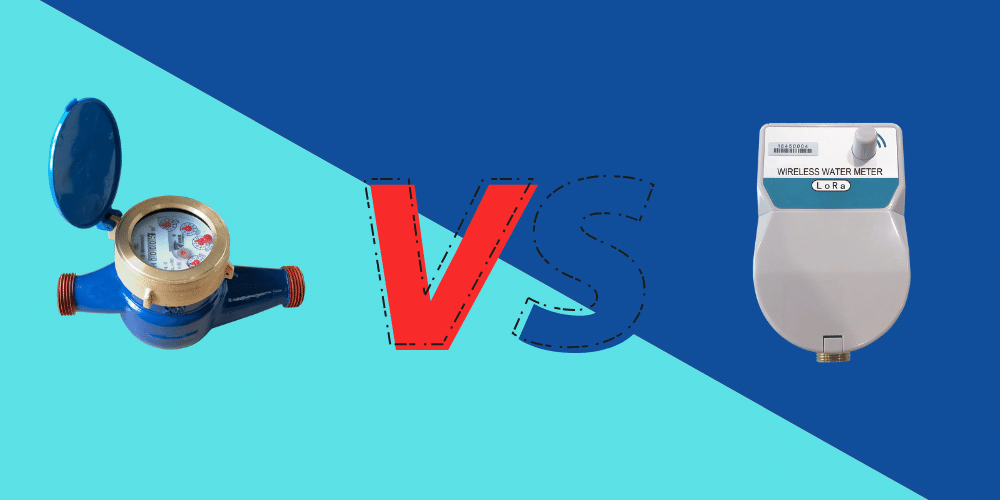
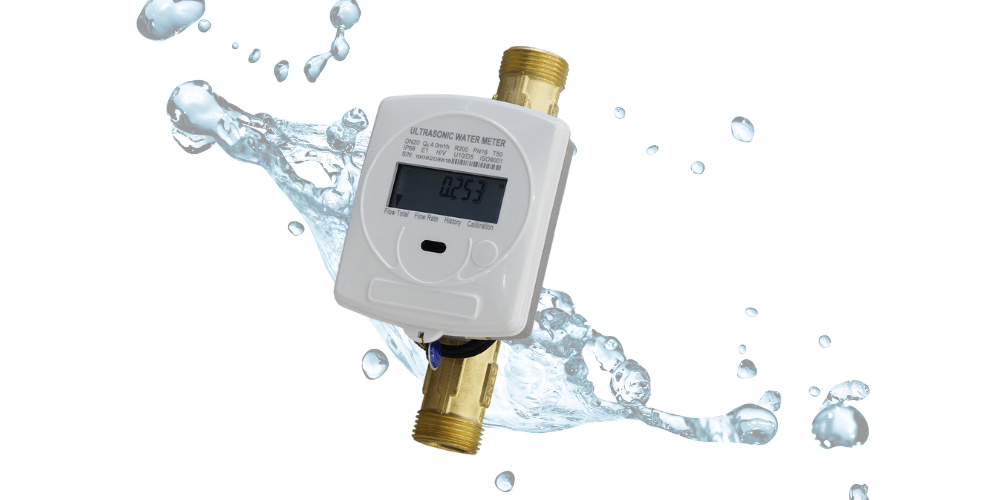
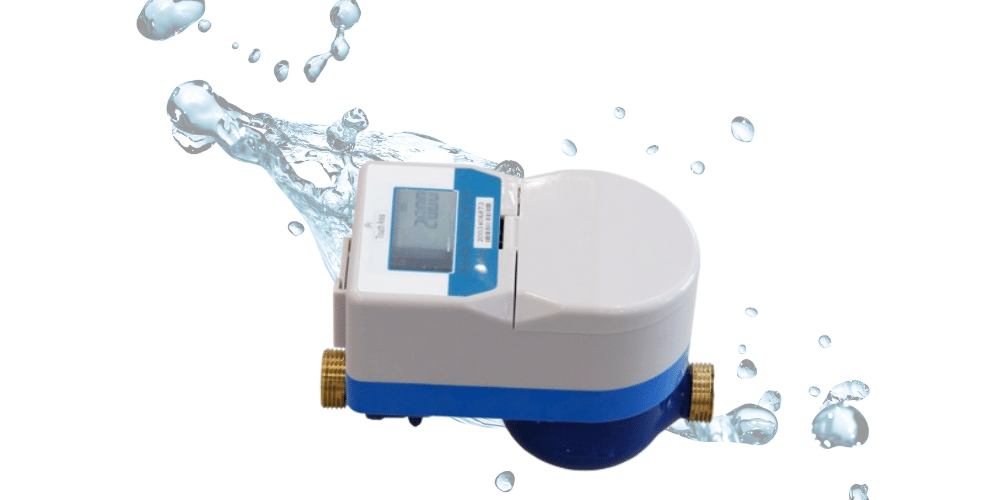
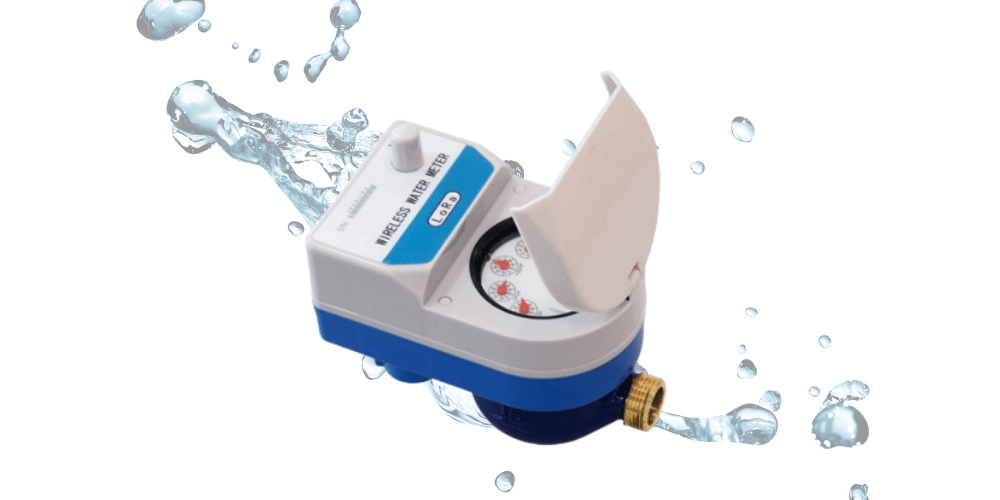
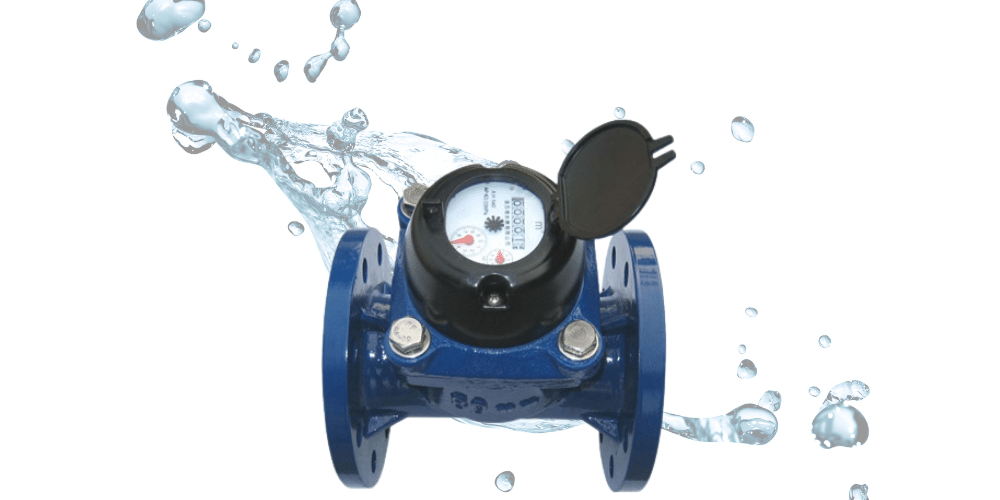
Smart water meter vs. mechanical water meter.

Here are some key differences between smart and mechanical water meters:
Smart water meters transmit data to a central database, whereas mechanical water meters do not. This allows businesses and residents to easily access their water use data in real-time.
Smart water meters help to control usage and can maximize efficiency, which directly affects costs. Users also can use the data analysis of their former, and correspondingly adjust their consumption, to minimize waste.
Smart water meters using remote access, compared with mechanical water meters using artificial reading, reduce personnel costs, human error, and valuable time.
The type of water meter and its advantages

Ultrasonic water meters use ultrasonic waves to measure the speed of a fluid.
This is a huge technological innovation that allows property owners and utility managers to capture accurate data in real time. In addition, because there are no mechanical parts inside the ultrasonic water meter that will wear out, these meters require little maintenance and therefore have a long service life.
Working principle of ultrasonic water meter:
The ultrasonic water meter uses the time difference method to measure the flow rate: that is, an ultrasonic transducer is installed on the left and right of the measurement channel (pipe section), and transducer A transmits an ultrasonic signal to transducer B (positive flow), and the transducer B transmits an ultrasonic signal to the transducer A (countercurrent), in the transmission process, the positive flow and the countercurrent ultrasonic signal form a certain time difference. By measuring the time difference, the speed of the water flow can be calculated. When the cross-sectional area of the calibrated pipe diameter is used, the flow velocity is converted into the flow rate to realize the flow measurement.

Pay first and use the water later,the prepaid water meter has mechanical and electronic readings.
The pre-paid water meter is a new type of water meter that uses modern microelectronic technology, modern sensing technology, and intelligent IC card technology to measure water consumption and carry out water data transmission and settlement transactions.
It has changed the traditional way of urban water supply management, implementing the "pay first, after water" mode. Get rid of the inconvenience of on-site meter reading and charging, which is beneficial to management and suitable for the prepaid management mode of property management companies and water utilities.

The wireless water meter uses advanced wireless transmission technology to convert the information of the traditional mechanical water meter into electrical signals, which are stored by the microelectronic control circuit.
The use of the Internet of Things (such as LORA/LoraWAN) technology to transmit water use data to remote data centers to achieve real-time monitoring and management of user water use, and help water supply departments improve water management.

Mechanical water meters were used as early as the early 19th century. A mechanical water meter works by measuring and recording the flow of water by rotating a piston or turbine-machine.
Volumetric mechanical water meter: mainly used in residential and small commercial places.When the flow is in low to moderate conditions, they can measure accuracy up to Class A.This type of mechanical water meter has a measuring element, the displacement is proportional to the volume of water through.
LoRa + LoRaWaN protocols in smart water meters
LoRa is a patented technology that enables low-power, long-distance transmission of digital wireless communication under specific radio waves. Its working principle is that LoRa uses linear frequency modulation technology to transfer information by changing the signal frequency in order to achieve long-distance coverage.
LoRaWAN, an open standard built on LoRa technology, is designed for Internet of Things (loT) applications to build low-power, wide-area iot networks.LoRaWAN allows battery-powered loT sensors to be connected to the Internet in local, regional, and global networks.
LoRa and LoRaWAN support two-way communication: In addition to sending data from sensors to the network, the network can also send messages or action calls to devices.
NB-IoT protocol in smart water meters
NB-IoT is a low-power wireless communication technology with wide coverage and very low power consumption.It with LoRa/LoRaWAN main difference is that the different frequency range, NB - IOT products comply with ISO standards around the world, so that they become the first tool of intelligent water meter industry.
Its main advantages are:
●Wide coverage: NB-IoT can provide good signal coverage in underground and remote areas, which is wider than traditional cellular networks.
●Cost effective: NB-IoT devices are usually inexpensive and less expensive to deploy, thus suitable for large-scale deployment.
●High capacity: NB-IoT networks are able to support a large number of device connections, which is particularly important for the growing number of iot devices.
●Standardization: NB-IoT is a standard based on cellular network technology developed by 3GPP (Third Generation Partnership Project), which ensures global compatibility and standardization.
●Security: As a cellular network technology, NB-IoT offers relatively high security and reliability.
GPRS protocol in smart water meters
GPRS is a wireless data communication technology based on GSM (Global System for Mobile Communications) network.
GPRS is suitable for relatively high speed transmissions, allowing multiple users to share the same network resources. Therefore, GPRS produces relatively high power consumption.
GPRS wireless remote transmission water meters are suitable for small areas of urban and suburban areas, and it is difficult to cover remote and rural areas.
GPRS can maintain connection state, means, GPRS wireless remote meter can send and receive data at any time, improve the convenience of communication.
All in all, GPRS wireless water meter realizes the intelligent management of water meter data through advanced communication technology, and provides water companies with more convenient and efficient water monitoring and management methods.
RS485 protocol for water meters
RS485 is a stable and reliable communication mode. Compared to wireless communications, wired connections provide stable and reliable data transmission with less likelihood of interference, thus helping to ensure data reliability. Due to high-speed transmission and stability, wired RS485 water meters can achieve real-time monitoring of water use, so as to find and solve problems in time.
In addition it supports long distance data transmission, suitable for water meter distribution on a wide range of scenarios, such as a large industrial area or large buildings.RS485 supports multi-point communication, allowing multiple water meters to be connected to the same bus for centralized management and monitoring.
FAQs
How does a smart meter supply power?
Typically, smart water meters use a built-in battery as the main power source. This way is suitable for small and low-power smart water meters since the battery can provide a relatively long service life.
In addition, some smart water meters integrate solar panels to power the meter by harvesting and converting solar energy into electricity.Or use vibration power generation technology, through the vibration of water to generate electricity.
There are also smart meters powered by an external source, usually connected to the grid via a power cord.
The power of the smart water meter type depends on the specific model smart water meter.
What about the smart water meters disadvantages?
The main disadvantages of smart water meters are network dependence and signal issues: as of now, not all utilities and municipalities around the world are able to support smart water meters, and smart water meters often rely on wireless networks or other communication technologies, so in areas with poor network coverage or unstable signals, it may affect the accurate transmission and reception of data.
Smart water meter can help you save money?
As we all know, installing smart water meters doesn‘t directly save you money.However, smart water meters can accurately measure water consumption and avoid excessive charges caused by estimation or meter reading errors.
Through the data display of smart water meters, users can adjust their water consumption habits and reduce unnecessary water consumption, thereby saving water bills.
Finally, smart water meters are able to quickly detect problems such as pipe leaks, which users can fix in a timely way to avoid high water bills caused by leaks that go unnoticed for a long time.








